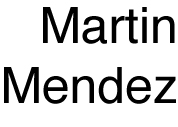Institutions: Maesters Program and a Professional Certificate in Biodiversity Conservation at the School of Natural Sciences at the University of Buenos Aires, E3B at Columbia University, CERC at Columbia University, and the Paul McGhee Division, SCPS at New York University.
(Maesters Program and a Professional Certificate in Biodiversity Conservation at the School of Natural Sciences at the University of Buenos Aires): this intensive course is targeted at a graduate student audience, and addresses fundamental concepts on population ecology applied to the management and conservation of natural populations. We have developed and taught this course together with Dr. Ricardo Gürtler, and with the collaboration of Dr. Lucía Rodriguez Planes.
{Austral Fall 2016, Austral Spring 2018,current Austral Fall 2020 }
(CERC, Columbia University): this 5-week intensive course is targeted at a continuing education audience, and explores the fundamentals of genetics and heredity, evolutionary ideas and evolution mechanisms, including Natural Selection, and their relevance to Society.
{Spring 2011, Spring 2012, Spring 2013, Spring 2014, Spring 2015}
(Paul McGhee Division, New York University): this semester-long course explores the history of the study of evolution and evolutionary ideas, the fundamentals of genetics and heredity, evolutionary mechanisms and evidence, and the relevance to evolution to Society.
{Spring 2011, Fall 2011, Spring 2012, Spring 2013, Spring 2014, Spring 2015}
(Paul McGhee Division, New York University): this 5-week intensive course is targeted at a continuing education audience and covers the most important threats to biosiversity worldwide and the most innovative approaches to conserve wildlife and wild places while preserving local livelihoods.
{Fall 2012}
(E3B, Columbia University): this semester-long course explores various methods of statistical inference of ecological patterns and processes using molecular data. We present the foundations for the molecular identification of populations to species, and apply various analytical methods to real datasets. The course uses real molecular datasets for the inference of population-level phenomena such as population structure, population growth and decline, detection of demographic bottlenecks, migration, and natural selection, and species-level issues such as species divergence and species diversity. I have taught this course together with Dr. Kolokotronis.
{Spring 2011}
Population Management
(Maesters Program and a Professional Certificate in Biodiversity Conservation at the School of Natural Sciences at the University of Buenos Aires): this intensive course is targeted at a graduate student audience, and addresses fundamental concepts on population ecology applied to the management and conservation of natural populations. We have developed and taught this course together with Dr. Ricardo Gürtler, and with the collaboration of Dr. Lucía Rodriguez Planes. {Austral Fall 2016, Austral Spring 2018,
Evolution
(CERC, Columbia University): this 5-week intensive course is targeted at a continuing education audience, and explores the fundamentals of genetics and heredity, evolutionary ideas and evolution mechanisms, including Natural Selection, and their relevance to Society. {Spring 2011, Spring 2012, Spring 2013, Spring 2014, Spring 2015}
Evolution
(Paul McGhee Division, New York University): this semester-long course explores the history of the study of evolution and evolutionary ideas, the fundamentals of genetics and heredity, evolutionary mechanisms and evidence, and the relevance to evolution to Society. {Spring 2011, Fall 2011, Spring 2012, Spring 2013, Spring 2014, Spring 2015}
Conservation of Biodiversity
(Paul McGhee Division, New York University): this 5-week intensive course is targeted at a continuing education audience and covers the most important threats to biosiversity worldwide and the most innovative approaches to conserve wildlife and wild places while preserving local livelihoods.{Fall 2012}
Molecular Ecology
(E3B, Columbia University): this semester-long course explores various methods of statistical inference of ecological patterns and processes using molecular data. We present the foundations for the molecular identification of populations to species, and apply various analytical methods to real datasets. The course uses real molecular datasets for the inference of population-level phenomena such as population structure, population growth and decline, detection of demographic bottlenecks, migration, and natural selection, and species-level issues such as species divergence and species diversity. I have taught this course together with Dr. Kolokotronis. {Spring 2011}

